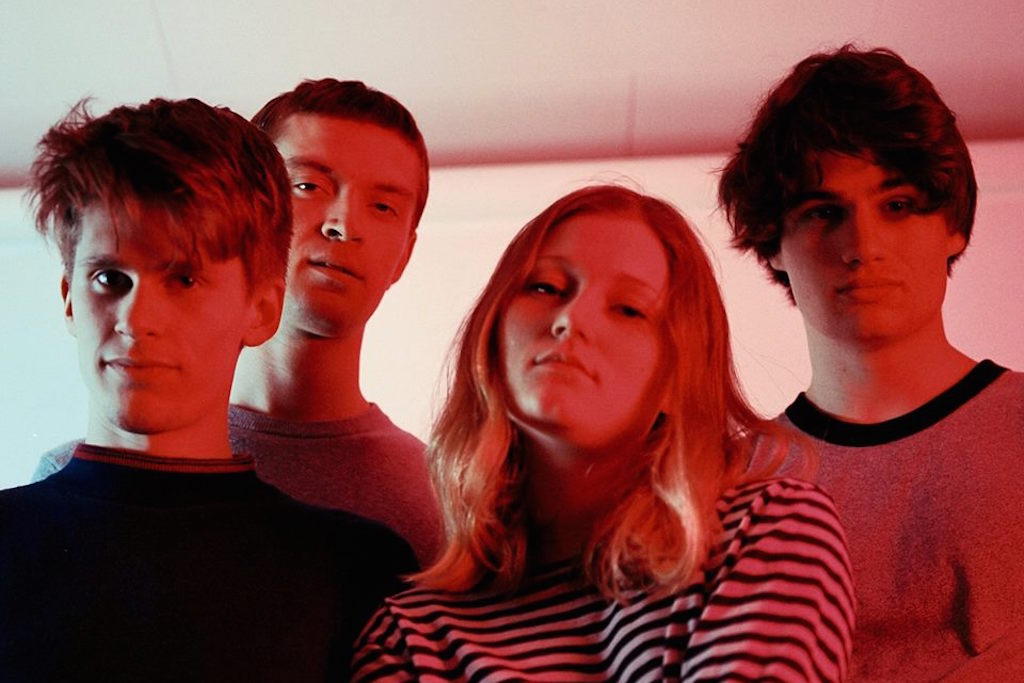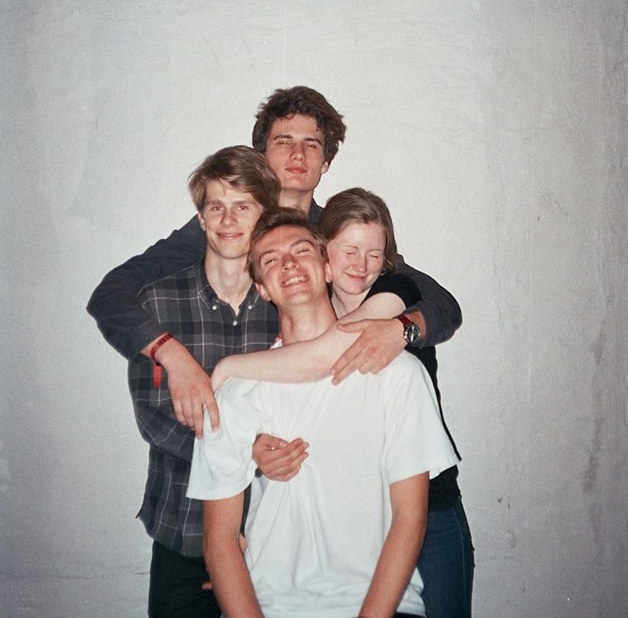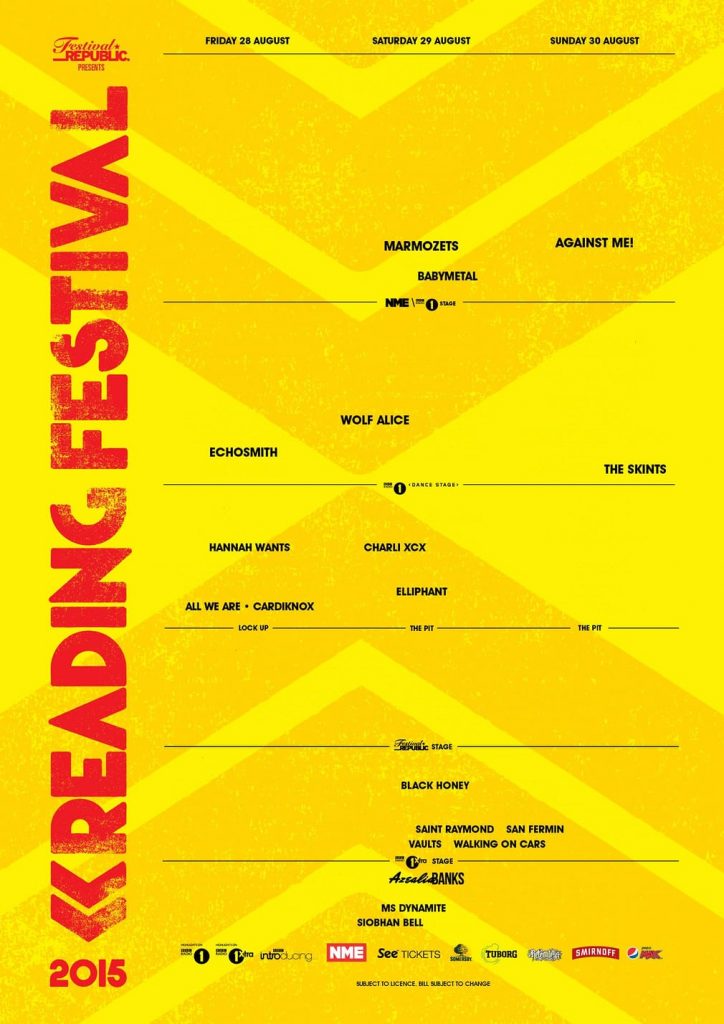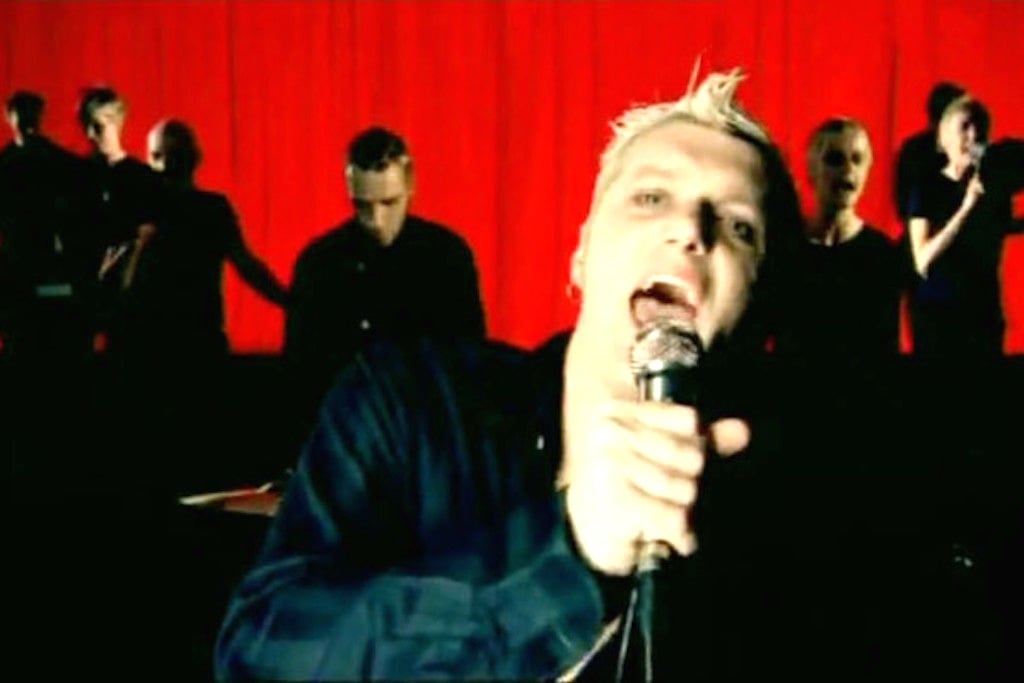Sløtface Are The Norwegian Feminist Punk Pop Band About To Take Over
--

They haven’t even so much as released their debut album yet, but Norwegian punk band Sløtface have already had a memorable few years.
They’ve been outspoken on feminist issues, been arrested for human rights protests, fought censorship with their provocative band name (it’s pronounced ‘Slutface’) and — in the midst of all of that — made four really sharp, catchy EPs, the most recent of which was last November’s Empire Records. They’ve also somehow made their way onto daytime radio both here, in the US and in their native country; as well as onto some impressive festival bills.
In fact, when Music Junkee first gets onto Haley Shea – Sløtface’s lead singer – she is en route to such a show. “I’m at the airport, waiting for the train,” she says. “We’re on our way to a festival in Norway. This is our third time at this festival, but we’re actually playing a karaoke set tonight. We play the songs live — kind of like a backing track — and the audience sings the songs.”
Before the train pulls up — and before the band tour Australia for the first time this September — Shea opens up about what bands can do to create safer spaces at shows, what the DIY scene means to the band and white boys with acoustic guitars.
It’s not often that Australian writers get to talk to bands from Norway — and when we do, it’s usually metal bands like Kvelertak or Enslaved. Typically, Norweigan punk isn’t really something that makes it over here. Can you give a tourist a snapshot of what the DIY scene is like?
It’s funny when international people tell us that Kvelertak are the only other Norweigan band they know — they’re actually from the very same small town that we’re all from. It’s the strangest coincidence.
“The whole DIY [thing] — wanting to build a scene — is why we wanted to start a band in the first place”
I think the whole DIY [thing] — wanting to build a scene — is why we wanted to start a band in the first place. We grew up watching American high school movies, and there’s always a band that plays live at someone’s house party. We wanted to be that band, and that wasn’t really a thing here.
There was this really famous Norwegian movie called The Man That Loved Yngve, which is set in our town and at the school that I went to. It’s based on a book, and in both the book and the movie they had bands playing at their parties. That’s what made us want to start a band — we wanted to create that experience.
We loved the idea of people meeting up and doing something together because they felt it was important, or just fun. We felt like that was missing in our community, in our local area. We wanted to create something that wasn’t so serious — a lot of the shows were heavy metal shows, rock shows or hardcore shows. They were great, especially because the hardcore bands were straight-edge, so underage kids could get in. They were all very serious, though.
We wanted to do a lot of similar things, except we wanted to focus more on having fun. We wanted everything that we did to feel like a party.
It feels like Sløtface has really built up a lot of momentum even before Try Not To Freak Out has officially come out. You’ve been getting daytime airplay here on triple j, building fan-bases in countries you probably haven’t even visited yet and getting to play major festivals across the world. Is that heightened attention being drawn to the band something that you find pressuring? Is it something you find at all compromising?
I think one of the nice things about being this type of band from a small town in Norway is that the scene here is so small. You know everybody that plays music, generally, but it also means that we’re kind of isolated from any kind of bigger global perspectives on us. Unless you go online and intentionally seek it out then it doesn’t really come up that much. It’s kind of nice to be in a completely different country, far away from all that kind of stuff.
Obviously, it’s really fun and exciting to have people care about your band. That’s a big part of why we do what we do. At the same time, though, it doesn’t affect our motivations for doing this either way.
The things we found exciting when we were first starting out are the things that we still find exciting now. We’re still amazed whenever we get to work on really big projects. We love making stuff together — music, videos, putting on a show or an event. We love talking with people every day about it. We love learning about other people’s stories and getting an insight into their own lives. It’s really interesting to us.
Those are the best parts about being in a band. That’s what we focus most of our energy on. All of that other stuff… I don’t know, it’s a little bit blurrier to us.

Sløtface / Photo by William Glandberger
This year we’ve had festivals like Warped Tour in the news on account of misogynist bands explicitly harassing audience members; while festivals in Sweden have had instances of sexual assault majorly impact on them, to the point where an entirely femme/non-male festival is being organised for 2018.
It can be quite difficult for the artists themselves to have agency and control in environments like this — the crowds are invariably far greater than what theirs normally might have been, and a lot of it happens well out of the line of sight. Do you feel as though bands and festival organisers are doing enough on their own accord to be preventative of this behaviour to the best of their abilities?
I think it’s a really tough thing to deal with, just like you said. I think that we need to talk about it more — just because people really need to know that this isn’t just the way things have to be.
You shouldn’t have to feel ostracised at a festival just because you’re being given unwanted attention. I think a big part of changing the attitudes towards it is talking about it. Even as a performer, you can make it a part of how you address the audience from the stage — let them know that there are security guards, and people at the festival that are there to help you if you need it. We need to make sure that people are a little more inclined to be extra aware of one another.
“You shouldn’t have to feel ostracised at a festival just because you’re being given unwanted attention”
As an artist, I know it’s easy to feel really powerless in situations like this. We’ve worked really hard as a band in the last year to come up with actual concrete things that we can do.
We want to make it as easy as possible for people to get themselves out of an uncomfortable situation if they happen to be at one of our shows. That’s much easier to do at a club show — at one of your own shows, where you have a lot more control and work with the staff.
At a giant festival, it’s much more difficult. I think instances like those Swedish festivals that you mentioned send a really clear, really direct message. This isn’t okay. Assault is not a part of music. I think that the Riot Grrrl movement, back in the ’90s, put these issues more in people’s faces — at least, as far as punk music and rock music is concerned.
In a way, I feel like the entire music industry is circling back to that now — as an entity, it’s learning that it has to be better. As long as we’re working towards concrete solutions, then I feel that we’re in a better place.
No doubt you’ve seen those .GIFs of festival posters where it shows you the line-up and then shows you the line-up again with all of the all-male acts removed from the bill. Sometimes, only a handful of acts remain — and, in some cases, the entire festival poster goes completely blank.
As a band that’s beginning to participate more and more in bigger festivals throughout Europe and Scandinavia, what do you feel promoters can do to address this imbalance head-on? Is there a way to do as such without festivals being accused of bringing in “token” acts from marginalised groups?
We talk a lot about this as a band. In Norway, there’s been a lot of talk for years about female and femme acts that appear on music festivals. Even just by having that dialogue, I feel like things have really changed in Norway — there’s definitely more of a balance now. I think that alone proves that change can come purely from something as simple as the issue being on people’s radar.
I definitely want to see that extending out to be more inclusive — of non-binary people, of people of colour. Obviously, there is still a lot of work that needs to be done. I just wrote a paper on this, actually. I was writing about how there are so many articles in publications that are discussing purely female inclusion, but if you search for the same issue in regards to other diverse groups then you more or less get nothing.
“There are so many quality bands out there in the world right now that feature diverse members. Talk to them.”
I feel like one of the major ways that promoters can combat having an all-male line-up is to search for music that exists outside of their comfort zone.
If you look at a lot of festivals on the market, a lot of it stems from having a guy who knows a guy who knows a guy who knows this band. I think that those that are putting on these kinds of events should really be out there, actively seeking out new acts and thinking twice about who they’re booking and why.
It’s like, “Okay, I have this idea of what I want my festival to be and what I want it to look like. Am I doing a good enough job of telling everybody’s story through the types of acts that I’ve chosen?” If the answer to that question is “no,” then maybe think again. Maybe go out of your immediate bubble and your comfort zone. Have an open mind. There are so many quality bands out there in the world right now that feature diverse members. Talk to them.

Reading Festival’s 2015 line-up, minus the male acts
This actually relates quite well back to one of your own lyrics: “I’ve filled my quota of boys with acoustic guitars.” That’s probably something that’s come from your own personal experience, but it can also relate back to the music scene at large. There is an insurmountable number of hetero, cis, white males out there that will have every opportunity thrown at them. Bands like Sløtface, often, have to work twice as hard to get half the recognition of your male peers. Is that something you’ve found that you have to deal with on a more regular basis now?
I don’t think it’s so much the opportunity that they get – I mean, every band is competing with one another in some way; and there’s a million acts that are stealing attention away from your band at any given moment.
I do, however, have a big problem with the fact that music is supposed to be about telling people’s stories. If you’re only telling one story — and it’s from their perspective — then you’re really missing out on what music can be. To me, that is the single most important thing about music and being a part of the music community: that no matter who is listening, everyone should be able to see and hear a part of their own lives in what somebody else is doing or singing about.
Music is about the people from all different walks of life, all different places. It’s not about one single voice or point of view. It never has been. That’s what I take issue with.
About a week before the album comes out, you’ll be in Australia and playing shows here for the very first time. Do you have any idea of what to expect while you’re over here?
It’s pretty much going to be a new experience for us. A lot of friends of ours have been exchange students over in Australia, though. We have a really good friend that just got back after six months over there, and they kept us updated on their life while they were living there.
Aside from the obvious things that everyone knows, like the animals and the beaches, I really like watching Please Like Me. It’s actually one of my favourite shows! It really seems to be a really accurate view of what it’s like for young people living in Australia, even though it’s obviously fictionalised. I feel like it’s kind of helped me to know more about Australia than just… kangaroos. [laughs]
—
David James Young is a freelance writer and podcaster. He tweets at @DJYwrites.
—
Sløtface’s debut album Try Not To Freak Out is out September 15 via Propeller/Caroline Australia.
—
Sløtface will appear at Bigsound on Tuesday September 5; find out more here.
